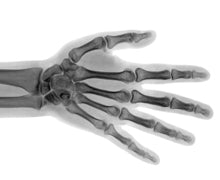
Scientists at Emory University have determined probiotics helped increase bone volume in mice and are hoping to see if a similar result can be found in humans. The results of the study published in the journal Immunity showed the strain of probiotic Lactobacillus rhamnosus GG (LGG) caused other intestinal microbes to produce the metabolite butyrate which then activated bone-enhancing immune cells and regulatory T cells.
"The significance of the study is that probiotics are, at least in mice, an effective means to increase bone density," says senior study author Roberto Pacifici of Emory University. "Clinical trials are in progress to validate the efficacy of probiotics in humans."
Pacifici and his team used oral supplementation of LGG over a span of four weeks and found it increased bone formation in the female mice they studied. They determined it did so by stimulating the growth of butyrate-producing gut bacteria like Clostridia.
"Because their mechanism of action in bone is unknown, they are regarded as some kind of alternative, esoteric, unproven treatment," Pacifici says. "Our goal was to identify a biological mechanism of action of probiotics, a mechanism that makes sense to traditional scientists, hoping that this will make probiotics a mainstream treatment."
Interestingly, researchers found the LGG supplementation had no effect on bone mass in mice raised in a germ-free environment. They believe this is because the probiotic generally interacts with other microbes normally found in intestines to bring about the positive effect.
The study was conducted with an eye toward a treatment for osteoporosis, a medical condition in which bones become brittle from tissue loss mainly as a result of aging. Hip fractures are common from osteoporosis and mortality rates for those experiencing a hip fracture are nearly 30 percent in the first year after the injury and nearly 50 percent have some permanent disability.
"We were surprised by the potency of the gut microbiome in regulating bone and by the complexity of the mechanism of action of probiotics," Pacifici says. "In general, there is a lot of interest in the concept that the gut bacteria regulate the function of distant organs. How this happens is largely unknown. We described a detailed mechanism by which changes in the composition of the gut microbiome induced by probiotics affect a distant system like the skeleton."
Treatment options for osteoporosis can be costly and come with unwanted side effects. To date, some small scale studies have yielded positive results with probiotic supplementation encouraging researchers to dig deeper into the subject.
"Our findings will need to be validated in human studies," Pacifici says. "If successful, this research could substantiate the use of butyrate or probiotics as a novel, safe, and inexpensive treatment for optimizing skeletal development in young people and to prevent osteoporosis in older people."



